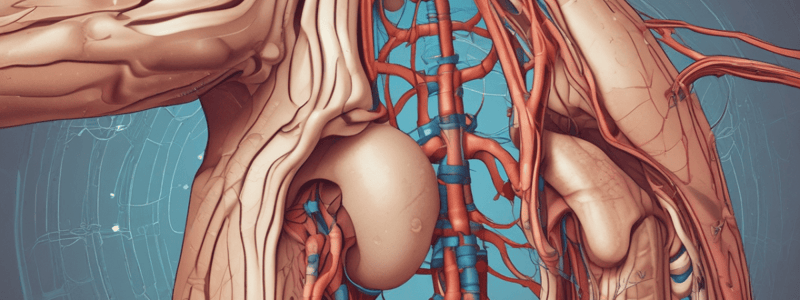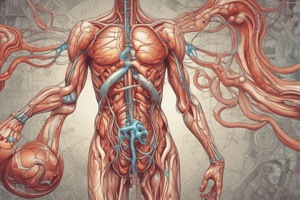Podcast
Questions and Answers
What is the primary function of the nephron in the urinary system?
What is the primary function of the nephron in the urinary system?
- To regulate electrolyte balance
- To initiate urination
- To store urine
- To filter blood, removing waste products and excess water (correct)
During renal filtration, where does the blood enter at a high pressure?
During renal filtration, where does the blood enter at a high pressure?
- The Bowman's capsule
- The bladder
- The urethra
- The glomerulus (correct)
What is the approximate capacity of the bladder?
What is the approximate capacity of the bladder?
- 200-300 milliliters
- 500-600 milliliters (correct)
- 1000-1200 milliliters
- 800-1000 milliliters
What is the purpose of ureteral peristalsis in the urinary system?
What is the purpose of ureteral peristalsis in the urinary system?
What is returned to the bloodstream during renal filtration?
What is returned to the bloodstream during renal filtration?
What is the layer of muscle that contracts during urination to release urine through the urethra?
What is the layer of muscle that contracts during urination to release urine through the urethra?
What is the primary function of the ureters in the urinary system?
What is the primary function of the ureters in the urinary system?
What is the term for the rhythmic contraction and relaxation of the smooth muscle in the walls of the ureters?
What is the term for the rhythmic contraction and relaxation of the smooth muscle in the walls of the ureters?
What is the functional unit of the kidneys?
What is the functional unit of the kidneys?
What is the process by which the kidneys filter blood to remove waste products and excess water?
What is the process by which the kidneys filter blood to remove waste products and excess water?
How often does ureteral peristalsis occur?
How often does ureteral peristalsis occur?
What is the organ responsible for storing urine in the urinary system?
What is the organ responsible for storing urine in the urinary system?
Study Notes
The urinary system is a crucial part of the human body, responsible for maintaining the balance of water, electrolytes, and waste products. It consists of the kidneys, ureters, bladder, and urethra. The primary functions of the urinary system are urine formation, ureteral peristalsis, nephron function, renal filtration, and bladder capacity.
Urine Formation
Urine formation is a complex process that involves the kidneys, ureters, and bladder. The kidneys, located in the lower back, filter blood to remove waste products and excess water. The resulting urine is then transported through the ureters, tubes that connect the kidneys to the bladder, to the bladder for storage. The bladder, a muscular sac, expands and contracts to store and release urine.
Ureteral Peristalsis
Ureteral peristalsis is the rhythmic contraction and relaxation of the smooth muscle in the walls of the ureters. This process helps to move urine from the kidneys to the bladder. Ureteral peristalsis is a constant process, occurring every 10-15 seconds, and is critical to the normal function of the urinary system.
Nephron Function
Nephrons are the functional units of the kidneys. Each kidney contains about one million nephrons. The nephron consists of a glomerulus, a tuft of capillaries surrounded by a Bowman's capsule, and a tubule, which is a long, convoluted tubular structure. The nephron's primary function is to filter blood, removing waste products and excess water, and returning essential substances, such as glucose and amino acids, to the bloodstream.
Renal Filtration
Renal filtration is the process by which the kidneys remove waste products and excess water from the blood. This occurs at the glomerulus, the tuft of capillaries inside the nephron. Blood enters the glomerulus at a high pressure and is forced through the capillary walls, allowing waste products and excess water to pass into the Bowman's capsule.
Bladder Capacity
The bladder is a muscular sac that stores urine. It has a capacity of about 500-600 milliliters. The bladder can expand to accommodate more urine, but when it becomes full, it sends signals to the brain to initiate urination. The bladder is lined with a layer of smooth muscle that contracts during urination to release urine through the urethra.
In conclusion, the urinary system is a vital part of human physiology. Its primary functions, urine formation, ureteral peristalsis, nephron function, renal filtration, and bladder capacity, work together to maintain the balance of water, electrolytes, and waste products in the body. Understanding these functions is crucial for maintaining optimal kidney health.
Studying That Suits You
Use AI to generate personalized quizzes and flashcards to suit your learning preferences.
Description
Learn about the urinary system, its components, and their functions. Understand how the kidneys, ureters, bladder, and urethra work together to maintain the balance of water, electrolytes, and waste products in the body. Test your knowledge of urine formation, ureteral peristalsis, nephron function, renal filtration, and bladder capacity.



